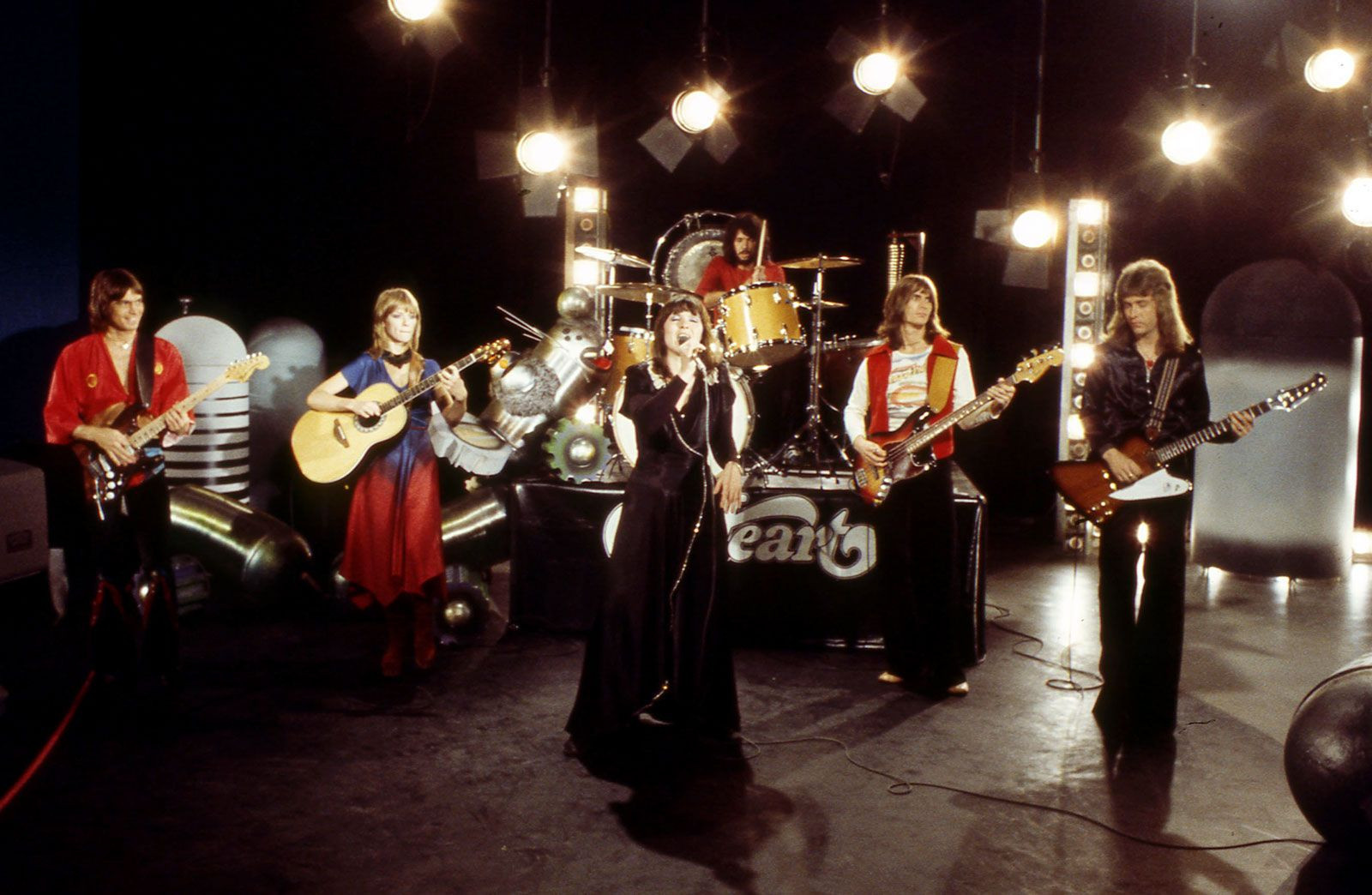Heart, the iconic rock band fronted by sisters Ann and Nancy Wilson, carved a unique space in music history, not just for their powerful vocals and songwriting, but also for Nancy Wilson’s exceptional guitar playing. As a prominent female guitarist in a male-dominated era, Nancy Wilson became a beacon for aspiring musicians and a key element in shaping Heart’s signature sound, rightfully earning her place as a true “Heart Guitar Player”.
Heart’s journey to stardom began with a pivotal moment opening for Rod Stewart in Montreal in 1975. Their electrifying performance ignited media attention, though often tinged with skepticism about women in rock music. The Wilson sisters met this negativity with resilience, channeling their passion into their music. In 1976, their debut album, Dreamboat Annie, exploded onto the scene, featuring anthems like “Magic Man” and “Crazy on You.” These tracks, reaching number 9 and 35 on the Billboard Hot 100 respectively, showcased not only Ann’s soaring vocals but also Nancy’s dynamic guitar work, establishing her as a force to be reckoned with on the instrument.
The follow-up album, 1977’s Little Queen, cemented Heart’s hard rock credentials. Influenced by Led Zeppelin, the album opened with the blistering “Barracuda,” a track defined by Nancy’s aggressive guitar riffs and powerful energy. Yet, Heart’s musical palette was broader than hard rock, as evidenced by the folk-infused melodies of “Love Alive” and “Dream of the Archer,” also on Little Queen. Nancy’s versatility as a guitarist, moving seamlessly between genres, became a hallmark of Heart’s sound. The subsequent albums, Magazine (1978) and Dog & Butterfly (1978), further explored this range, with “Heartless” delivering a hard-rock punch and “Straight On” achieving Top 40 success.
The late 1970s also saw personal changes within the band, as the Wilson sisters’ relationships with the Fisher brothers ended, leading to their departure. The early 1980s proved to be a challenging period for Heart. Albums Bébé le Strange (1980) and Private Audition (1982) struggled to resonate with audiences and critics, signaling a potential decline. Further lineup changes occurred with the dismissal of drummer DeRosier and bassist Fossen. Despite these shifts and the album Passionworks (1983) underperforming commercially, Heart was poised for a dramatic reinvention.
1985 marked Heart’s resurgence and a shift towards a more pop-oriented arena rock sound. Their self-titled album, Heart (1985), became a massive commercial triumph, selling over five million copies. It spawned their first number-one hit, “These Dreams,” featuring Nancy Wilson on lead vocals, showcasing her vocal talents in addition to her guitar skills. The album also delivered further hits like “Never,” “What About Love?”, and “Nothin’ at All,” solidifying their comeback. Bad Animals (1987) followed, selling over three million copies and producing standout tracks “Who Will You Run To” and “Alone,” their second chart-topping single. In 1990, Brigade was released, featuring the hit “All I Wanna Do Is Make Love to You,” which reached number two on the Billboard Hot 100. Throughout this commercially successful period, Nancy Wilson’s guitar playing remained integral, adapting to the evolving sound while retaining its signature heart and soul.
Heart continued to release albums, including Desire Walks On (1993). In a nod to their influences, they collaborated with former Led Zeppelin bassist John Paul Jones for The Road Home (1995), featuring live acoustic renditions of Heart classics. This project highlighted the enduring strength of their songwriting and Nancy’s acoustic guitar skills. Heart returned to the studio in the 2000s and 2010s, releasing Jupiters Darling (2004), Red Velvet Car (2010), and Fanatic (2012), demonstrating their continued creative drive.
Beyond Heart, both Ann and Nancy Wilson pursued individual projects. Ann Wilson achieved success with Mike Reno on “Almost Paradise” (1984). Nancy Wilson ventured into film scoring, composing for Cameron Crowe’s movies like Jerry Maguire (1996) and Almost Famous (2000), further showcasing her musical versatility.
The Wilson sisters also collaborated on a children’s book, Dog & Butterfly (2009), and their memoir, Kicking & Dreaming: A Story of Heart, Soul, and Rock and Roll (2012), offering insights into their personal and musical journey. A highlight of their career came in 2012 when they delivered a memorable performance of Led Zeppelin’s “Stairway to Heaven” at the Kennedy Center Honors, an emotional tribute witnessed by Led Zeppelin members themselves. Heart’s induction into the Rock & Roll Hall of Fame in 2013 solidified their lasting impact on music. Heart’s legacy, largely shaped by Nancy Wilson’s passionate and skillful guitar playing, is one of female empowerment and enduring rock and roll success. Nancy Wilson, the heart guitar player of Heart, proved that women could not only succeed but also lead and innovate in rock music, inspiring generations of musicians to follow their hearts.


 Nancy Wilson performing live, her guitar embodying the heart and soul of Heart's music and stage presence.
Nancy Wilson performing live, her guitar embodying the heart and soul of Heart's music and stage presence.